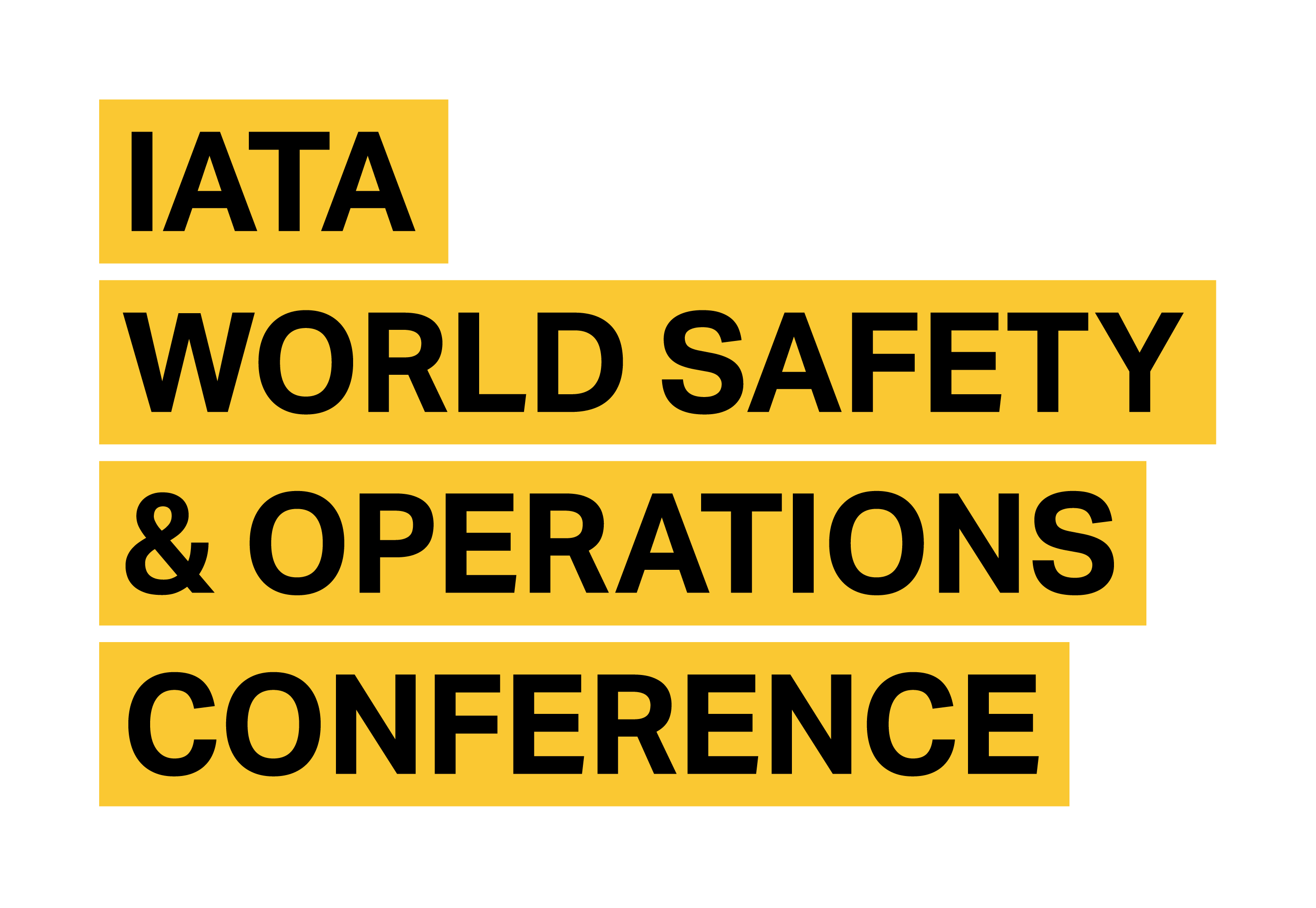IATA World Safety and Operations Conference
Event Information
Futureproofing Aviation Safety
IATA’s WSOC 2025 Set to Tackle Critical Aviation Safety Challenges
The World Safety and Operations Conference (WSOC) 2025, taking place from 14-16 October in Xiamen, China, will bring together global aviation experts to address a wide array of pressing safety issues. This year’s event is set to offer fresh perspectives on industry challenges, with a focus on crisis management, dangerous goods, GNSS spoofing, spectrum allocation and more.
Mark Searle, IATA’s Global Director of Safety, highlights the significance of holding the conference in China, given the country’s strong safety record in aviation. “Hosting WSOC in China offers a fresh perspective on current safety initiatives,” Searle explains. “The exchange of insights and best practice will help raise safety standards globally.”
Crisis Management: Separating Fact from Fiction
Crisis management will be a key focus at WSOC 2025, with an emphasis on improving industry preparedness. Recent incidents have highlighted the ongoing need for robust crisis response strategies. Searle, underscores the critical issue: “Relying on speculation or unverified experts can distort facts and impede efforts to objectively identify causes and improve safety in the industry.”
At WSOC, experts will explore how the aviation community can better handle crises by eliminating guesswork and focusing on clear, evidence-based decision-making. The conference will stress the importance of building response frameworks that rely on verified information rather than external influences, which can cloud judgment and delay effective action.
Dangerous Goods: Addressing the Growing Threat of Lithium-Ion Batteries
As more passengers carry electronic devices on board, managing dangerous goods, especially lithium-ion (Li-ion) batteries, has become a critical safety concern. Recent incidents, including fires caused by overheated power banks and faulty batteries, have underscored the risks these devices pose. At WSOC 2025, the focus will be on enhancing cabin crew training to better recognize and manage these hazards.
Experts will explore best practices for identifying potential risks from power banks, laptops, and other battery-powered electronics, as well as emergency procedures for handling battery-related incidents. The goal is to equip cabin crew with the knowledge and tools needed to ensure safety as the number of electronic devices carried by passengers continues to grow.
GNSS Spoofing: Tackling a Growing Threat
Another critical issue to be addressed at the conference is the rising threat of Global Navigation Satellite System (GNSS) spoofing. Although conflict zones have traditionally been the focal point, the scope of GNSS spoofing is broadening, with more isolated incidents being reported. The growing accessibility of spoofing equipment raises alarms about potential risks to global aviation. Attendees will discuss how to move from awareness to actionable solutions, focusing on limiting the opportunities for spoofing and mitigating its impact on operations.
Improving Runway and Wildlife Safety
WSOC will also present groundbreaking tools aimed at improving runway safety. Traditionally, runway safety initiatives have been fragmented, often tailored to specific regions or airports. This year, IATA will introduce a more unified approach, leveraging ICAO Standards and Recommended Practices (SARPs) to create a comprehensive runway safety toolkit. This initiative aims to identify systemic issues, define improvement measures, and establish success metrics for enhanced runway safety globally.
Similarly, wildlife management will be another key area of focus. IATA will unveil a toolbox of recommended practices to streamline wildlife hazard management, emphasizing the importance of a more proactive and coordinated approach to minimizing wildlife-related safety risks at airports.
Risk-Based IOSA: A New Approach to Auditing
More familiar safety themes will also be revisited, including the IATA Operational Safety Audit (IOSA), which has recently moved ‘risk-based’. This methodology allows airlines to focus on the specific risks that are most relevant to their operations. The shift to Risk-Based IOSA is already delivering positive results. Searle explains, “It challenges airlines to take a closer look at their operations and audits have become more consistent through a single, standardised auditor pool. We’re seeing more positive safety trends as a result.”
Risk-Based IOSA has already demonstrated its effectiveness in improving safety. With over 440 airlines on the IOSA registry, the audits have identified an average of 28 findings per audit, although some airlines have reported single-digit findings, while others have identified as many as 90. The ultimate goal is a downward trend in safety-critical findings over time, something that has already been demonstrated with airlines who have undergone two risk-based audits.
Tackling Emerging Safety Issues
Several other safety topics will be explored during conference, including:
- Aircraft Equipment Mandates: As airlines face pressure to implement mandatory equipment upgrades, the conference will examine the logistical challenges of meeting these requirements, particularly when the necessary equipment is unavailable within the prescribed timelines.
- Spectrum and 5G Mitigation: With the expiration of temporary 5G mitigation measures, there is increasing concern about potential interference with radio altimeters. WSOC will explore how the industry can address this issue and ensure the development of altimeters capable of filtering out such interference.
- Rescue and Firefighting Services: While airports declare their firefighting capabilities, there’s a growing need for regular checks to ensure these services are consistently meeting operational standards. WSOC will discuss how airports verify their rescue and firefighting capabilities to guarantee readiness in case of emergency.
WSOC: A Pivotal Event for Aviation Safety and Innovation
WSOC is more than just a conference; it is a key event in the aviation industry calendar, setting the stage for advancing safety and resilience across the sector.
Despite the challenges, aviation continues to be one of the safest modes of transport says Searle, “Air travel is incredibly safe, and the topics being discussed at WSOC reflect our unwavering commitment to maintaining that safety record. We expect lively debates and fresh perspectives that will drive the industry to even greater heights of safety.”
Through collaboration and continued innovation, WSOC 2025 will help ensure that aviation remains a model of safety and operational excellence in the years to come.
WSOC will feature a diverse lineup of speakers, showcasing the breadth of expertise needed to continue to drive safety improvements. Willie Walsh, IATA’s Director General, and Searle will join forces with industry leaders and safety experts such as Xie Bing, CEO and President, Xiamen Airways; Yannick Malinge, SVP and Chief Product Safety Officer, Airbus; Elmarie Marais, CEO, GoCrisis; Al Madar, VP Operational Safety and Deputy Chief Aerospace Safety Officer, Boeing; and Crispin Orr, Chief Inspector of Air Accidents, UK AAIB.
Their insights are expected to fuel meaningful discussions and promote collaborative solutions.
View the WSOC Program.
#IATAWSOC
Event Profile
-
Who attends?
- Airlines executives and frontline operational staff – pilots, engineers, safety managers, cabin crew, engineers, air traffic controllers
- Regulators
- Training Providers
- Emergency Equipment Suppliers
- Accident Investigators
- Original Equipment Manufacturers
- Human Factors Specialists
- Aircraft Recovery Specialists

-
5 Top reasons to attend
- Dedicated sessions with industry leaders highlighting state of the industry, how to seize opportunities and address challenges.
- Focused discussions with industry experts on current operational issues impacting aviation; and what IATA and their industry partners is doing about them.
- Identification and understanding of new and emerging industry risk areas and how, collectively, they can be addressed by aviation stakeholders.
- Extensive peer-to-peer networking opportunities with a global audience.
- Opportunity to participate in bespoke workshops provided by IATA, sponsors and exhibitors.

Contact
IATA Centre
33 Route de l'Aéroport
PO Box 416
Geneva 15 Airport - 1215

